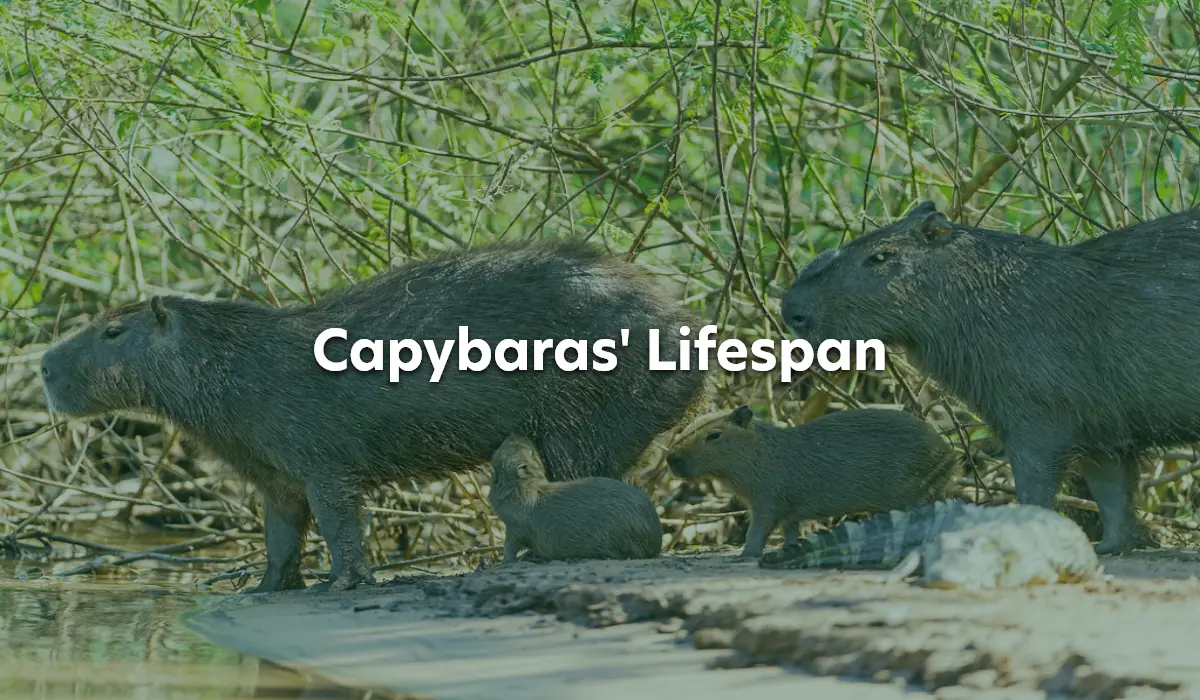Diving into the captivating world of Capybaras, we unlock the mysteries surrounding their lifespan. With their charming persona and unique features, these fascinating creatures have caught worldwide attention.
However, a perennial question that intrigues many is – “How long do Capybaras live?” In this article, we will explore and unravel the facts behind the lifespan of Capybaras and significant factors, discerning their journey from the wild wetlands of South America to the well-monitored habitats in captivity.
Join us as we delve deep into this endearing creature’s life to understand what influences their longevity and survival in both the wild and captivity.
How Long Do Capybaras Live?
Capybaras’ lifespans vary significantly, with their survival differing based on whether they reside in the wild versus under the watchful eye of humans in captivity.
Survival in the Wild
When Capybaras freely roam the South American wetlands and rivers without intervention, they have an average lifespan of between 8 to 10 years.
Nevertheless, living in the wild can pose numerous challenges.
- Predators: Capybaras are a favored prey for an array of predators, including jaguars, anacondas, and caimans. Aside from these natural predators, humans have also been known to hunt Capybaras for their meat and hide.
- Habitat and Environment: Environmental factors play an essential role in determining a Capybara’s lifespan. Habitat depletion, deforestation, and climate change can threaten a Capybara’s natural environment, making it more challenging to find shelter and food sources.
- Food and Nutrient Access: Capybaras mainly consume grass, so it’s vital that ample, high-quality grass is available. A compromised habitat can result in a decrease in nutritional resources, which directly affects the animal’s health and longevity.
Living under Human Care
When Capybaras live in captivity—such as in zoos, sanctuaries, or as pets—they are likely to have their life expectancy extended.
Under proper care, Capybaras can live anywhere from 12 to 14 years, thanks to several factors:
- Controlled Diet: When Capybaras are under human care, their diet can be intentionally regulated, with access to high-quality food and clean water. Caregivers can ensure they consume essential nutrients for optimal health and avoid malnourishment.
- Regular Healthcare: Veterinary care for the animals can ensure early detection of any illnesses or parasites that might plague them. Timely diagnosis and treatment can significantly improve their living conditions and life expectancy.
- Predator Safeguards: Living in protected environments, the possibility of falling prey to natural predators is greatly reduced. Capybaras in captivity no longer need to fear being hunted down by jaguars or ensnared by humans.
Caring for Captive Capybaras: Making a Difference
While captive environments may prolong a Capybara’s life, it is essential to acknowledge that not all captive situations are equal.
To ensure a healthy and long life for a Capybara in captivity, caretakers must offer optimal conditions that support their well-being.
- Spacious Living Quarters: Outfitted with loving caregivers, as well as clean water and grass to graze on, Capybaras need access to proper living conditions, free from over-crowding or poor sanitation, to thrive.
- Social Interaction: Capybaras are social animals by nature, and caretakers must allow them to interact with each other to create a more comfortable living environment.
- Enrichment Activities: Both caretakers and owners must provide Capybaras with activities that stimulate their minds and keep them engaged. Enrichment can include swimming pools, toys, and stimulating grasses or trees for grazing.
Conclusion
In essence, a Capybara’s lifespan is influenced by its environment, access to food and healthcare, and its housing conditions.
With a life expectancy of 8 to 10 years in the wild, these fuzzy herbivores may live longer in captivity, ranging from 12 to 14 years under the right conditions.
By understanding and appreciating the factors that contribute to a longer life, we can better appreciate these captivating creatures and contribute to their conservation efforts.
